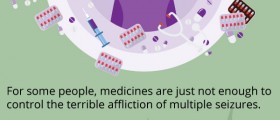
Epilepsy
Epilepsy is a disorder which affects brain neurons and causes seizures. Epileptic seizures are characterized by uncontrollable movements, twitching and convulsing. During a seizure, you may also feel pain or lose consciousness. There are various causes of epilepsy. It can be a consequence of brain injury, diseases such as meningitis or viral infections of the brain, dementia or congenital disorders.Treatment
Treatment for epilepsy usually involves medications which will prevent seizures. Some cases of epilepsy may involve a surgery. The surgery is performed only if the affected part of the brain can be removed without any consequences. Another form of treatment includes specially designed diet. This diet is called the ketogenic diet and it involves consuming food rich in fat, but low in carbohydrates.Medications
Medications for epilepsy help prevent the seizures. One of the medications used for treating epileptic seizures is Felbatol. This medication can be given to both children and adults. Another medication is Neurontin, which affects brain chemicals and prevents seizures and pain. Lamictal is also a medication which is given to prevent seizures. Lamictal is recommended for children and adults. Other medications include Topamax, Gabitril, Diastat and Lyrica.Side Effects
Each medication has its own list of side effects, but the most common side effects of medications for epilepsy may include fatigue, skin disorders, changes in weight, diarrhea, headache, problems with speech, problems with coordination and dizziness. You may experience these side effects when you start taking any of the medication. Most of the side effects, especially if they are in a mild form, will go away after your body adjusts to the mediation. However, if any side effect becomes persistent, severe or you experience worsening of the symptoms, you should contact your doctor as soon as possible. Serious side effects are severe skin disorders, pain in the stomach, constipation, vision impairment, sleeping disorders, mood and behavior changes, suicidal tendencies, pain in the chest, irregular pulse, pain in the muscles and general weakness.Precautions
Before you start taking any of the medications for epilepsy, you should inform your doctor about any allergies or medical conditions. Some of the medications are not recommended if you have any problems with liver or kidneys, mental problems or if you have diabetes. Pregnant women and women who are breastfeeding should discuss with their doctor about taking any medications because they might harm the baby. However, the unborn baby can suffer from damage if the mother experiences seizure during pregnancy.











_f_280x120.jpg)



Your thoughts on this
Loading...